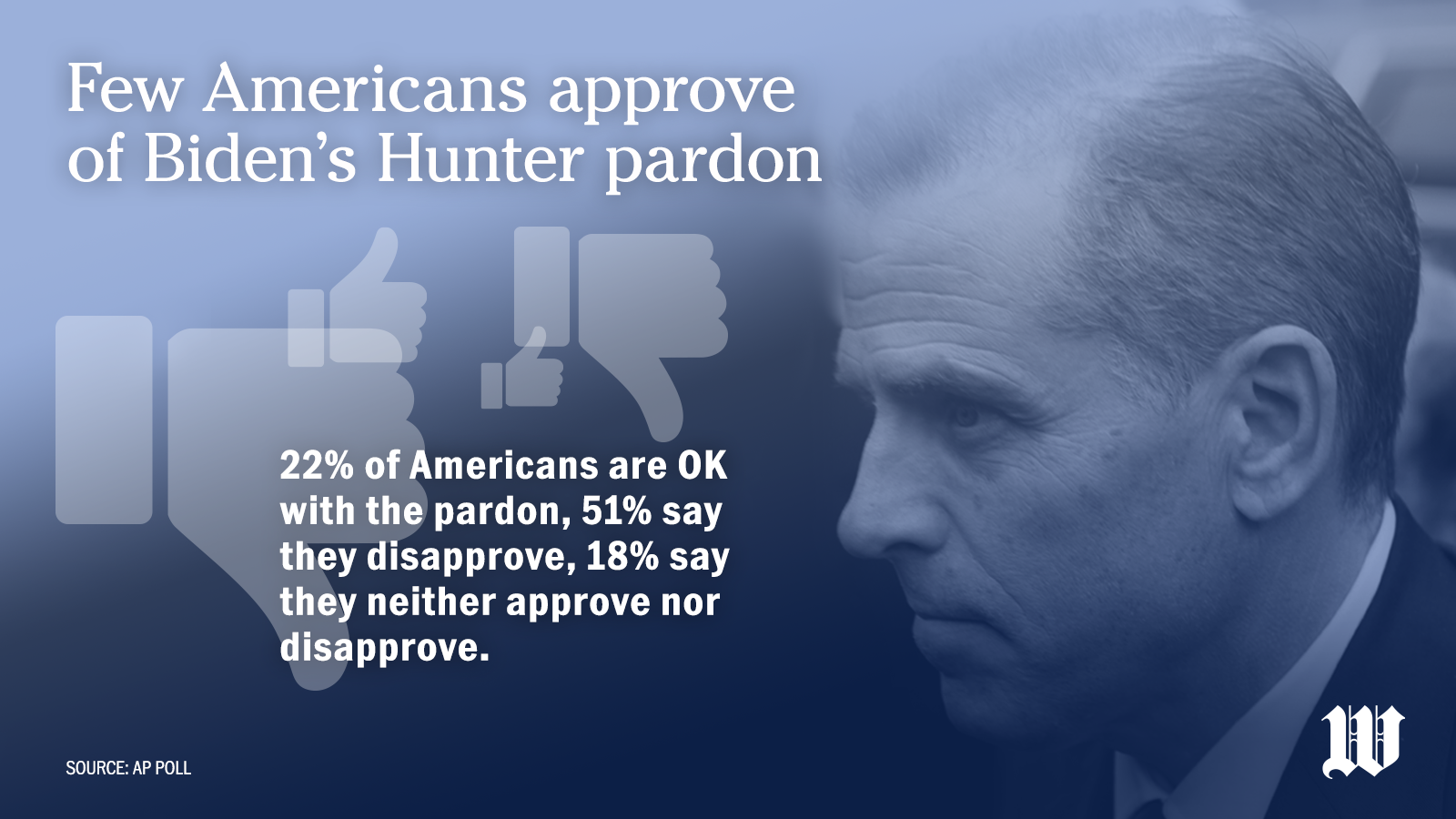Only a small number of Americans, 2 in 10, approve of President Biden’s decision to pardon his son Hunter Biden.
An AP-NORC poll out Wednesday found that 22% of Americans are OK with the pardon after the president said he wouldn’t do so. While 51% say they disapprove, 18% say they neither approve nor disapprove.
More Democrats, 38%, back the president’s decision than independents, 12%, and Republicans, 7%.
Mr. Biden issued the pardon after his son was convicted of felony gun and tax charges this year. The pardon covers any crime Hunter Biden has committed or may have committed in nearly an 11-year span.
“I respect President Biden, but I think he got this one wrong,” Rep. Greg Stanton, Arizona Democrat, posted on X. “This wasn’t a politically motivated prosecution. Hunter committed felonies and was convicted by a jury of his peers.”
Sen. Michael Bennet, Colorado Democrat, said the president’s decision “put personal interest ahead of duty and further erodes Americans’ faith that the justice system is fair and equal for all.”

Mr. Biden isn’t the first president to pardon a family member. President-elect Donald Trump pardoned Charles Kushner, the father of his son-in-law Jared Kushner, toward the end of his first administration. President Clinton pardoned his half brother Roger Clinton on his last day in office.
There has been a lot of talk about who should receive pardons as Mr. Biden prepares to leave the White House.
The idea of preemptive pardons has been floated as a possibility for those likely to be targeted by Mr. Trump. Some names on the list reportedly include former GOP Rep. Liz Cheney, and Sen.-elect Adam B. Schiff, California Democrat, both of whom were members of the committee that looked into the events of the Jan. 6, 2021, attack on the Capitol. The committee’s probe lasted years and resulted in recommending criminal charges against Mr. Trump.
Dr. Anthony Fauci, the former leader of the National Institute of Allergy and Infectious Diseases during the COVID-19 pandemic, and retired Joint Chiefs of Staff Chairman Gen. Mark A. Milley are other names reportedly considered.
However, the idea of preemptive pardons doesn’t sit well with some lawmakers.
“I strongly oppose preemptive pardons,” Mr. Blumenthal, Connecticut Democrat, said on CNN on Wednesday. “First of all, in some ways it’s going to be perceived as an implicit acknowledgment of guilt.”
His comment came after Mr. Trump over the weekend said that members of the Jan. 6 committee “should go to jail.”
A group of judges, federal and state prosecutors, religious leaders and law enforcement officials called on Mr. Biden earlier this week to commute the sentences of inmates on federal death row before Mr. Trump, who supports the death penalty, takes office.
In letters to the president, the advocates urged Mr. Biden to change the sentences of those on death row to life without parole.
“The federal death penalty represents a profound failure of our justice system; riddled with inequities and errors that undermine its legitimacy. By commuting the sentences of those on federal death row, President Biden can take decisive action to prevent this deeply flawed system from inflicting further harm,” said Bryan Porter, Commonwealth’s Attorney for Alexandria, Virginia.
Currently, there is a moratorium on executions, but Mr. Trump has vowed to end it when his term begins. There are 40 people on federal death row.
The White House said last week that Mr. Biden was considering more pardons, but didn’t name anyone specifically.
• Jeff Mordock contributed to this report.
• Mallory Wilson can be reached at mwilson@washingtontimes.com.




Please read our comment policy before commenting.